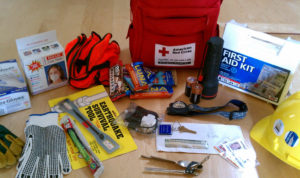 Prepare for Fire, Flood and Other Disasters
Prepare for Fire, Flood and Other Disasters
It’s the season of wood burning fires and string upon string of electric lights, so having working smoke detectors in your home is a good place to start when it comes to protecting your family in an emergency. But you should be prepared for more than just an accidental fire. Severe winter storms, flooding, or other emergencies could force you to either evacuate or remain in your home, possibly without power. Experts recommend that you and your family members come up with a plan to be prepared for any number of emergency scenarios.
Communicate
In the event of a fire, flood or other emergency that requires evacuation, cell phones will likely be your lifeline to getting help and letting other family members know where you are. Part of your family’s emergency plan should be designating an outside relative or friend as a contact person and having your family memorize his or her phone number. If you or another family member are away when an emergency happens, and for some reason you can’t get reach each other directly, use your outside contact as a way to “check in”. It may sound silly, but also make sure that members of your family know each other’s cell phone numbers. If you don’t have battery power or your cell phone, you won’t be able to just tap on someone’s name to connect with them.
Plan An Escape Route
If you have to leave your house quickly, especially in the middle of the night, it helps to have an evacuation plan. The American Red Cross recommends sitting down with the whole family to go over different escape routes from each room and have practice drills with different types of emergency situations in mind. Give each family member a responsibility, such as collecting flashlights, rounding up the family pet or assisting young children or elderly family members. Installing motion sensor lighting in your home’s hallways is something to consider as part of your emergency evacuation plan. Your plan should also include an agreed upon meeting place outside of your house.
Learn Some Skills
Even young children can be taught to call 911, but you should also make sure they know when to call for help. Adults should learn where the main water, gas and electric lines come into the house and how to shut them off. In addition to regularly testing your home’s smoke alarm and carbon dioxide alarm systems, buy a small fire extinguisher and show family members how to use it as part of your family’s fire prevention plan.
Keep Emergency Supplies
Depending on the emergency situation, you might have to shelter in place in your home. Emergency supply kit recommendations include three days of water and food for each person in the house (don’t forget a manual can opener if you have canned food), a battery or solar-powered radio for news updates, solar-powered battery charger, flashlights, blankets or sleeping bags, personal hygiene items, and a first aid kit with medications. If someone in your house requires medical equipment or other essential devices powered by electricity, you might want to have a portable generator on hand or have a licensed electrician install a backup power system.
Taking just a few of these steps now can keep your family safe and comfortable if you face an unexpected disaster.

